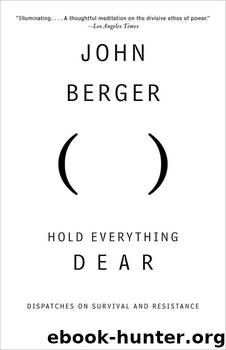Hold Everything Dear by John Berger

Author:John Berger [Berger, John]
Language: eng
Format: epub
ISBN: 978-0-307-49587-7
Publisher: Knopf Doubleday Publishing Group
Published: 2006-12-31T16:00:00+00:00
The Chorus in Our Heads or Pier Paolo Pasolini
(June 2006)
IF I SAY HEwas like an angel, I can't imagine anything more stupid being said about him. An angel painted by Cosimo Tura? No. There's a St. George by Tura which is his speaking likeness! He abhorred official saints and beatific angels. So why say it? Because his habitual and immense sadness allowed him to share jokes, and the look on his distressed face distributed laughter, guessing exactly who needed it most. And the more intimate his touch, the more lucid it became! He could whisper to people softly about the worst that was happening to them and they somehow suffered a little less,‘… for we never have despair without some small hope.' ‘Disperazione senza un po' di speranza.' Pier Paolo Pasolini (1922–1975).
I think he doubted many things about himself, but never his gift of prophesy which was, perhaps, the one thing he would have liked to have doubted. Yet, since he was prophetic, he comes to our aid in what we are living today. I have just watched a film made in 1963. Astonishingly, it was never publicly shown. It arrives like the proverbial message put in a bottle and washed up forty years later on our beach.
At that earlier time, many people followed world events by watching not the TV news, but newsreels in cinemas. In 1962 G. Ferranti, an Italian producer of such reels, had a bright idea. He would give the already notorious Pasolini access to his news archives from 1945–62, in order to answer the question: Why was there everywhere in the world a fear of war? He could edit whatever material he chose, and write a voice-over commentary. The resulting one-hour film would hopefully boost the newsreel company's prestige. The question was ‘hot' because, at that moment, the fear of yet another World War was indeed widespread. The nuclear warhead crisis between Cuba, the USA and the USSR erupted in October 1962.
Pasolini, who had already made Accattone, Mamma Roma, and La Ricotta, accepted for his own reasons, because he was in love with and at war with History. He made the film, and entitled it La Rabbia (Rage).1
When the producers saw it, they got cold feet and insisted that a second filmmaker, a notoriously right-wing journalist called Giovanni Guareschi, should now make a second part and that the two films should then be presented as one. As things turned out, neither was shown.
La Rabbia, I would say, is a film inspired by a fierce sense of endurance, not anger. Pasolini looks at what is happening in the world with unflinching lucidity. (There are angels drawn by Rembrandt who have the same gaze.) And he does so because reality is all we have to love. There's nothing else.
His dismissal of the hypocrisies, half-truths and pretences of the greedy and powerful is total because they breed and foster ignorance, which is a form of blindness towards reality. Also because they shit on memory, including the memory of language itself, which is our first heritage.
Download
This site does not store any files on its server. We only index and link to content provided by other sites. Please contact the content providers to delete copyright contents if any and email us, we'll remove relevant links or contents immediately.
Cecilia; Or, Memoirs of an Heiress — Volume 1 by Fanny Burney(32558)
The Great Music City by Andrea Baker(32019)
Cecilia; Or, Memoirs of an Heiress — Volume 2 by Fanny Burney(31956)
Cecilia; Or, Memoirs of an Heiress — Volume 3 by Fanny Burney(31942)
We're Going to Need More Wine by Gabrielle Union(19046)
All the Missing Girls by Megan Miranda(16028)
Pimp by Iceberg Slim(14508)
For the Love of Europe by Rick Steves(14121)
Bombshells: Glamour Girls of a Lifetime by Sullivan Steve(14075)
Talking to Strangers by Malcolm Gladwell(13370)
Norse Mythology by Gaiman Neil(13365)
Fifty Shades Freed by E L James(13241)
Mindhunter: Inside the FBI's Elite Serial Crime Unit by John E. Douglas & Mark Olshaker(9343)
Crazy Rich Asians by Kevin Kwan(9292)
The Lost Art of Listening by Michael P. Nichols(7506)
Enlightenment Now: The Case for Reason, Science, Humanism, and Progress by Steven Pinker(7313)
The Four Agreements by Don Miguel Ruiz(6765)
Bad Blood by John Carreyrou(6621)
Weapons of Math Destruction by Cathy O'Neil(6280)
